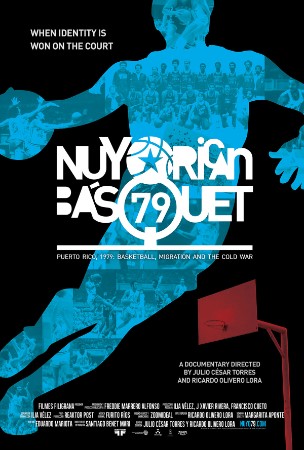
Nuyorican Básquet 2017
Distributed by Third World Newsreel, 545 Eighth Avenue, Suite 550, New York, NY 10018; 212-947-9277
Produced by Freddie Marrero
Directed by Ricardo Olivero Lora and Julio César Torres
Streaming, 108 mins
College - General Adult
History; Puerto Rico; Sports
Date Entered: 07/14/2020
Reviewed by Russell A. Hall, Reference and Instruction Librarian, Penn State ErieNuyorican Básquet is nominally a film about the Puerto Rican men’s basketball team’s excellent performance in the 1979 Pan American Games (held in San Juan, Puerto Rico). However, the film is about much more than that. It explores themes of ethnic and cultural identity, national identity, colonialism, Cold War politics, and the intersection of sports in all these areas.
Before going further, it is important to note that nearly all of the language spoken in the film is Spanish, with English subtitles available. This reviewer has a very minimal understanding of spoken Spanish so that may inform how this film was reviewed.
Puerto Rico became a territory of the United States in 1898 as a result of the latter’s victory in the Spanish-American War. Puerto Rico’s citizens became U.S. citizens by an act of Congress in 1917 (though there is more to the story of Puerto Rican citizenship beyond the scope of this review). The film relates that in a push to deal with persistent unemployment and poverty in the 1950s and perhaps beyond, the Puerto Rican government pushed many inhabitants to leave the island to emigrate to New York City and other major U.S. cities. Those that left for the States developed multiple identities as Puerto Ricans and Americans (and for those in New York, particularly a New York identity). As one of the interviewees in the movie puts it, “identity is multiple and it is very rich and varied.”
Puerto Rico, despite being a territory of the United States, was granted its sporting independence in 1948 by the International Olympic Committee. This allows Puerto Rico to compete in international sporting events (such as the Pan Am Games and the Olympics) as its own entity and with its own athletes. This led the leaders in Puerto Rican sports to look to the States for athletes of Puerto Rican origin, and in basketball, this meant many of the athletes came from New York City. The 1979 men’s basketball team was made up primarily of these “Nuyoricans.” Nuyorican is often employed as a derisive term by people living in Puerto Rico to be applied to those that were not born and raised on the island (though not all see it that way and it is not used in that manner in this review). The film raises many fascinating points about who can be considered Puerto Rican. Do you have to be born there? Raised there? Both? Do you have to have parents born there? Grandparents? Something else? Undoubtedly, the Nuyorican basketball players of the 1979 team felt culturally different, as some of them had never been to Puerto Rico until they arrived to play basketball as adults or near adults. The success of the 1979 team at the Pan Am Games lifted its players above any stigma they might have had as Nuyoricans, and many of them became heroes in Puerto Rico (Raymond Dalmau later had an arena named in his honor). Another complicating factor in terms of identity is that all of these people, despite their different nationalities or sub-nationalities were all U.S. citizens. This points out the wider questions of colonialism, nationality, and ethnicity.
Added complexity in terms of colonialism came from the governor Puerto Rico (elected in 1976) making a push for total annexation by the U.S. One of the interviewees in the film said that the governor was “attacking everything related to Puerto Rican pride,” including sports. It was in this context that the 1979 Puerto Rican basketball team in the Pan Am games in San Juan. The team played extremely well, making it to the gold medal game undefeated. Their opponent in that game: The United States. The game was the colonizer versus the colonized in San Juan at a time of great national upheaval over identity. The Puerto Rican team came up short but played very well against a team that included at least two future NBA Hall-of-Famers.
Puerto Rico’s silver medal qualified them for the 1980 Olympic Games which were held in Moscow, USSR. Because of the Soviet invasion of Afghanistan, the U.S. boycotted the Moscow Olympics. The Puerto Rican Olympic Committee voted to attend the games despite the boycott. However, pressure from the Puerto Rican government (which was presumably pressured by the U.S. government), led to only three Puerto Rican boxers participating the in the Moscow Games. Due to the Cold War machinations of the superpowers, one the colonial ruler of Puerto Rico, the Nuyorican heroes were denied their opportunity for Olympic glory.
From an educational standpoint, this film would be appropriate for many courses due to the complex interdisciplinary topics it discusses. With a 1-hour and 48-minute running time, the film is likely too long to be screened in class, so it would probably be best viewed out of class or shown as extensive clips. Long stretches of the film focus on the individuals on the team (which does enhance the film) but could likely be cut down and still provide students with a very nuanced view of the complex themes discussed in the film. Nuyorican Básquet is a valuable film that shows the complexities of colonialism, ethnicity, and nationality through the lens of sports. This film is highly recommended.